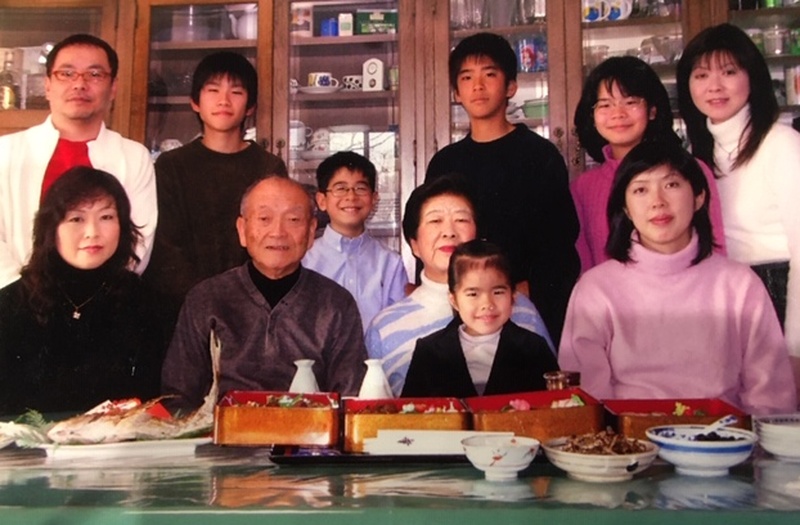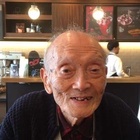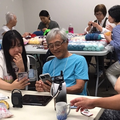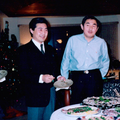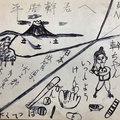Employment with Santai Trading Company
After seven years with Sogo, in 1959 Tak moved to the textile export division of a medium sized trading company called Santai Trading Company. He would stay there until 1977. As he explains, this job involved a wide variety of business endeavors and interesting experiences.
While working in Tokyo at Amerex Trading Co., I had met many Japanese businessmen and one of them became a director of the department store. He was also president of his own trading company, Santai Trading Co., and in 1959, he asked me to join his company, which I did and worked there from July 1959 to July 1977.
At Santai I was involved in exports and imports. The company started importing blue denim fabrics from the US to be made into jeans in Japan. This business took off and we were so successful that we were importing denim fabrics by the container loads. Eventually, Japanese weavers learned how to make blue denims and were exporting the fabric to U.S. and Europe. In my opinion, Santai was one of the pioneers of the Japanese jeans market.
Another project I was involved in at Santai was the lumber business. We started a joint venture company with a Japanese lumber company to manufacture door jambs. The equipment and know-how to make the jambs were supplied by an American company. Our Japanese partner in the joint venture was well versed in the local lumber industry and our American suppliers had the manufacturing know-how. However, the Japanese partner had no experience in working with a foreign company and the American company had no experience in Japan, so we were an important link.
One of my responsibilities was to accompany the president of Santai on his trips overseas. He had never been overseas before and was looking forward to his first overseas visit, but had some qualms. He told me that he was concerned lest he get lost. I told him that if he got lost, I would be the one most concerned so he should stay by me. We went to New York and from there to Florida and on to Santo Domingo in the Dominican Republic where we had an office staffed by a man we had sent from Japan.
Once we were invited to the Japanese employee’s home for a Japanese dinner. We were there for about an hour when our hosts started to worry. It turned out that they had ordered some fish from a Japanese retiree living there who liked to fish and took orders to supplement his income, but on this occasion he couldn’t catch anything for a long time. Finally he came back successful and we were able to enjoy sashimi.
On one of my frequent business trips I was visiting our liaison office in New York. The manager was driving me through Long Island when another car rammed us on the driver’s side. Fortunately, the accident occurred right in front of a doctor’s house and he came out and laid the manager, who was unconscious, on the ground and placed a pillow under his head. The ambulance took us to a hospital and the manager’s damaged spleen was taken out. I had a few stitches, but nothing serious like the manager’s injuries.
Since the manager was going to be hospitalized for a long time and his family had just arrived in a foreign country, I had to extend my visit to take care of the office and his family. So, what started as a one month visit lasted for six months before I could return to Japan. However, it was not all bad since it gave me an opportunity to visit the New York World’s Fair which was being held during this time.
Employment with Fujicopian
In 1977 Tak moved to Fujicopian, a company which now manufactures various kinds of stationery and printing supplies as well as ink cartridges, etc. for computers and high tech business machines. He would stay there until retiring at age 78. He was placed in charge of foreign affairs and travelled overseas a lot as he worked to establish subsidiaries and technology licensees in various countries including the US, the UK, Hong Kong, Malaysia, France and others.
Ever since I started working, I was also moonlighting to supplement my income to support my family. All the companies I helped were involved in export or import from overseas and English was the language used in communications. I could type, so I was very fast at writing business letters. I also helped in the business negotiations, by letter or telephone.
When the business friends visited Japan, I would help with the negotiations and in the evenings I would be involved in entertaining them as well. In those days, salaries were not very high as profits were kept in the company. Hence moonlighting was very lucrative for me and one of the presidents of a company for which I moonlighted asked me to join his company. I had been helping him for 17 years and he knew me well.
He used to say that the interview took 17 years and we couldn’t find anything wrong with each other. We agreed on a handshake and I joined the company in August 1977. In March, 1978, I was elected to the board of directors of the company as manager of the Foreign Affairs Department.
I served five presidents while at Fujicopian. My responsibilities also included overseas trips with the then president and our wives. One trip was to sign a very large and lucrative financing contract undertaken with German and Japanese banks. While we men worked, the banks arranged for chauffeur-driven cars with interpreters for our wives and they were entertained royally. Every evening we would be invited to dinner at the best restaurants. The contract was signed in an old castle on the Rhine and they flew Japanese and German flags and there were rumors the next day that the Japanese had bought another castle!
My wife enjoyed those trips which included opening ceremonies of our subsidiary companies in England and the U.S.A. She enjoyed the sightseeing and being so nicely entertained. Of course, the best part was that she didn’t have to do any housework during these trips. We ate at the best restaurants and the hotel took care of our other needs like laundry.
Around 1988, shortly before the Berlin Wall came down, Tak visited Berlin with a group of tourists. He was surprised at how the people he saw in East Germany were always somber faced and never smiled. The East German officer accompanying their group did numerous headcounts, specifically after every site they visited to make sure no one was missing from the group. At one point, when they were at Checkpoint Charlie undergoing a customs check, a cat suddenly dashed into the room. To break the tension, Tak made a joke, asking if the cat was escaping East Germany and if they were going to catch it. Apparently the other members of the tour group laughed, but the East German border guards did not, either because they did not understand the joke or they were just not amused. Tak later realized that his joke was a dangerous mistake and regretted it.
He also remembers watching people boating on a lake on the east-west border. The lake was divided into east and west by a line of ropes and floats. There were two guard boats patrolling the east side of the lake, while on the west side he could see several pleasure boats. Whenever the pleasure boats would approach the line of floats on border, the guard boats on the east side would rush to intercept them lest they crossed, and the pleasure boats would of course do a U-turn back to the west in time to avoid being caught.
Tak frequently made business trips to New York, during which he often stopped in Toronto and Vancouver where he met up with old Japanese Canadian friends and attended special events such as school and internment camp reunions. When he reached retirement age (65), he was asked to stay on at Fujicopian as an advisor which he did until finally retiring at age 78.
* This series is an abridged version of a paper titled, “A Japanese Canadian Teenage Exile: The Life History of Takeshi (Tak) Matsuba,” published in Language and Culture: The Journal of the Institute for Language and Culture, Konan University, March 2020.
© 2020 Stanley Kirk


